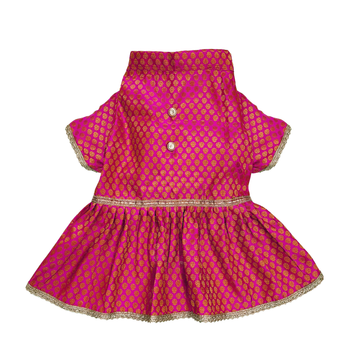French Bulldog

French Bulldog
| Breed Highlight: |
|
Bred primarily as companion dogs, Frenchies crave all the love and affection we humans have to offer. They’re just as satisfied playing with kids and other dogs as they are being a couch potato. Goofy, yet intelligent, French bulldogs make an easygoing best friend for any dog lover. |
| Weight: |
|
8 - 14 kgs |
| Height: |
|
24 - 35 cms |
| Life Expectancy: |
| 11-12 years |
| Litter Size: |
| Puppies. |
| Breed Appearance: |
|
While they may not have the same handsome elegance of a golden retriever, the French bulldog is undeniably charming. They have a small, compact body that's well-proportioned and fairly muscular, with the exception of the wrinkled skin around their face and shoulders. Frenchies most often come in colours like cream, fawn, and white, but they can also have brindle patterns or black masks. They have trademark dark brown eyes and an adorable "squished up" face. Their smooth, shiny coats only require occasional brushing to stay clean, and they shed a moderate amount. A healthy full-grown French bulldog tops out at around 28 pounds, making them the miniature version of a classic bulldog (which can get up to 50 pounds). Two distinctive features of the French bulldog are its bat ears and half-flat, half-domed skull." |
| History: |
|
The French Bulldog originated in England and was created to be a toy-size version of the Bulldog. The breed was quite popular among lace workers in the city of Nottingham and when many lace workers emigrated to France for better opportunities, they naturally brought their little bulldogs with them.
The French Bulldog thrived in France and Europe, and his charm was soon discovered by Americans as well. The United States saw its first French Bulldog at the Westminster Kennel Club show in 1896. The breed was quickly nicknamed "Frenchie," and it is still an affectionate name that is used today. |
| Originally: |
|
France |
| Currently Used As: |
|
The French Bulldog is among the most popular dog breeds because they are low energy and adaptable to any home, even a tiny apartment. They’re also comfortable living with individuals or families. It doesn’t hurt that they are also quite cute. Since 2011, the increase in popularity is not just about their size and appearance. Their temperament plays a role as well. They’re a total package and meet the needs of lots of people and families looking for the right pet. |
| Training: |
|
Frenchies are smart and willing to learn, teaching them consistently is a great way to strengthen your bond. This breed also tends to be food-motivated, which is especially helpful when training your dog. French bulldogs can also be difficult to housetrain: Crate training is one way to address this problem. Socialization is equally important to ensure your Frenchie is well-adjusted to their environment. You can begin teaching this breed basic obedience as early as eight weeks old, and it's helpful to take your puppy to train and socialization classes when they're ready. This is a great way to teach your dog new commands while helping it become more comfortable around new people and other dogs. Most French bulldogs can coexist happily when raised with other pets, but some are prone to chasing cats or small dogs. A Frenchie who hasn't been socialized with other animals may show aggression towards dogs of the same sex. This breed can also show jealousy and competition in a multi-dog household. Most are friendly with children, but when rescuing a dog, it's always important to discuss their history with children and pets to ensure they're a good fit for your household. |
| Health & Care: |
|
Because of their front-heavy structure, Frenchies cannot swim and should never be left unattended near a tub, pool, or body of water. Like all flat-faced breeds, Frenchies are prone to breathing problems and do poorly in hot or humid weather. Flat-faced breeds are also more sensitive to anaesthesia. Frenchies occasionally have eye conditions such as cherry eye, juvenile cataracts, or entropion, and skin allergies and autoimmune skin disorders also are known to occur. A responsible breeder will take advantage of available tests to screen breeding stock for conditions that can affect the breed. French bulldogs require notably less exercise and grooming than many popular dog breeds, but some can use a little extra training (depending on your specific dog's needs). As long as your Frenchie is properly socialized with new people and other animals when first adopted, they should become a friendly and happy companion in your household. |
| Living Condition: |
|
A French bulldog is able to be happy in any housing. This breed is suitable for city life, because no large yard is required. He is not meant to be a jogging companion, but he is always willing to go for a brisk walk. The French bulldog does not require a lot of food, and his short coat is easy to keep clean. Facial wrinkles should be cleaned regularly. The Frenchie snorts and snores, but somehow, it's part of his appeal. He prefers to spend his time in the house, receiving all your attention. |
| Exercise: |
|
In general, the Frenchie is more of a lapdog than a jogging partner, but routine exercise is still important with caution. This breed can easily overheat due to its short, stubby nose and potential airway problems. Daily exercise is very important, but don't overdo it: Playing with toys in the house or running around the yard for limited periods of time is best. The French Bulldog Rescue Network notes that Frenchies are poor swimmers, and you will need to supervise this breed around a pool or other water sources. |
| Grooming: |
|
Frenchies are smooth-coated dogs that tend to shed at a moderate rate. The breed requires little more than basic routine grooming, including weekly brushing. They lose their undercoat in the spring and fall, so owners may want to brush them more during those seasons. If your Frenchie is prone to skin issues, then baths with skin-soothing shampoo and regular ear cleaning may help. The deep skin folds might need a little attention to rid them of debris using a damp cloth or baby wipe, followed by being thoroughly dried. Trim your dog's nails every few weeks to prevent them from cracking or splitting. It's also recommended to practice preventative oral hygiene by brushing its teeth two to three times per week; this can help keep the breed's common gum infections and dental problems at bay. |
| Pros: |
| Their charming, unique personalities, Great companions, Love to cuddle, Loyal, Smart |
| Cons: |
| Farting, Prone to Separation Anxiety / Clingy, Health Issues, High Maintenance, Stubborn |












